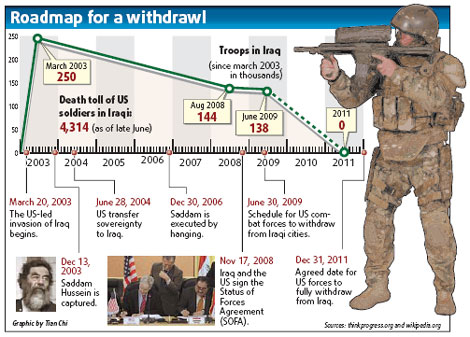
|
WORLD> Middle East
 |
|
Iraq: Emerging state or a state of emergency?
By Zhang Haizhou (China Daily)
Updated: 2009-06-30 10:00 Four Chinese enterprises, including communications giant Huawei, had invested in Iraq by autumn last year, according to the economic and commercial officers' office at the embassy. "The situation is unstable now and has been getting more dangerous recently," said the official, who refused to give his name. "The Chinese here must rely on security firms employed by their companies."
 A fresh bout of violence has erupted in Iraq in the past few days, which many say has been prompted by the approaching deadline for withdrawal. On June 20, a lorry bomb killed 70 people in Taza, a Turkmen town just south of the city of Kirkuk; two days later at least seven explosions in and around Baghdad killed 30, and at least 70 more died in the capital on June 24 in another bomb blast. "The insurgents, knowing that the Americans are poised to pull out, are aiming to make Iraq as unstable as ever," the Economist magazine reported recently. Some of the residents of the country's most dangerous cities, such as Mosul and Baqouba, meanwhile, have called for the US troops to stay. Amer Habeeb Huwaid, 30, of Baqouba, told USA Today he feared that, once the US had withdrawn, no one would push the Iraqi government to provide security or basic necessities, such as electricity. His neighbor Shaker Alwan also said his family had abandoned their home after four bodies with slashed throats were dumped on a nearby road. "The Iraqi army is strong now and they will get better," said the 40-year-old, "but I don't want the Americans to leave completely. I want to be able to walk around at midnight and feel safe. Then, the Americans should leave." However, both the US and Iraqi authorities have played down fears over the withdrawal. Nuri al-Maliki, the Iraqi prime minister, said he is "absolutely certain the withdrawal will not make our security worse" and told the Economist the removal of US troops from towns would be a "great victory for Iraq". General Odierno agreed the time was right to withdraw. "I do believe (the Iraqi security forces) are ready," he told the US-based CNN. "We've seen constant improvement in the security force, we've seen constant improvement in governance." Privately, many US officers worry the Iraqis will be overwhelmed if the violence surges, having relied for years on the US for everything from firepower to bottled water, Associated Press (AP) reported yesterday. But US President Barack Obama insisted there is no turning back. Handing over control of the cities brings him one step closer to fulfilling his campaign pledge to end an unpopular war that has claimed the lives of more than 4,300 US troops and tens of thousands of Iraqis, AP reported. Mohammad Sabir Ismail, Iraqi ambassador to China, told China Daily yesterday the local forces were "capable of controlling the security situation". "I have full confidence that the Iraqi security forces are capable of taking responsibility," he said, adding that the government has established a new anti-terrorist taskforce and is strengthening its intelligence agencies. Yin Gang, a Middle East expert at the Chinese Academy of Social Sciences, also said the withdrawal would not lead Iraq back into chaos. "The level of political reconciliation is already very high. Military conflicts between sects are impossible, even though differences still exist between them," he said. He explained the US withdrawal had little to do with containing terrorist attacks because that was the "business of the intelligence service" and, despite blaming Sunni al-Qaida members for recent attacks, said the mainstream Sunnis and Shi'ites had been united in cracking down on militants since late 2006. "Iraqi people don't want chaos," he added. "Any suggestion the country will fall into chaos humiliates its population."
|